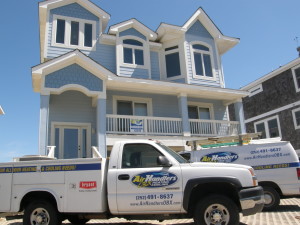Some years ago, in October 2008, the Internal Revenue Service added geothermal heat pumps to section 25D — that is, Residential Energy Efficient Property — of its Code. This addition offers homeowners a 30 percent tax credit on all expenses related to the installation of qualified property.
The tax credit applies to all types of homes: First, second, or third; single-family, apartment, condo, even mobile homes, and may be claimed for spending on “qualified geothermal heat pump property” installed in connection with a new or existing dwelling unit located in the United States, and used as a residence by the taxpayer. Applicable expenses include the purchase price of the geothermal heat pump property itself, as well as any associated piping, wiring, and interconnected ducting; and labor costs.
What constitutes a “qualified geothermal heat pump property”?
A qualified geothermal heat pump property:
- uses the ground or ground water as a thermal energy source to heat the dwelling unit or as a thermal energy sink to cool the dwelling unit
- (AND) meets the requirements of the Energy Star® program in effect at the time of installation
When must the property have been placed in service?
The Residential Energy Efficient Property credit can only be claimed on related spending for property placed in service during the period of time from 2008 through the end of 2016.
But what does that mean, “placed in service”? Pursuant to IRS Code 25D, such property is considered to be placed in service when installation is completed, except in the case of new or re-construction. Such property is then considered placed in service when the taxpayer takes up residence in the new, or newly renovated house.
“I live in a condo; can I still claim the Residential Energy Efficient Property Credit?”
Yes. Well, maybe. Let me explain.
When you purchased that condo, chances are you also agreed to abide by the codes and regulations of a condominium management association: You may be prohibited from affixing a satellite dish to your home, and it may be written into the agreement that you can’t rent out the property when you decide to move. Sure, the rules are strict, but the perks are plenty: The community offers a dog park, and a pool, and more; they’re not all fun and games.
When, and if this management association invests in the installation of geothermal heat pump property, each member homeowner can claim a tax credit on his/her share of the spending. That being said, the association must qualify, officially, as a homeowners’ association under section 528(c)(1) of the tax code, and “substantially all” of the units must be residential.
How do I claim the credit?
Advise your tax preparer of your interest in claiming the Residential Energy Efficient Property Credit, and tell him Air Handlers OBX recommends using IRS From 6595 to do so.
Call Air Handlers OBX with questions about installing new geothermal heat pump property in your home on North Carolina’s Outer Banks.
We hear it all the time: “Why didn’t we know about this tax credit before?” And for that, well, we don’t really have an answer except to say, “Now you know.”
Wait, what’s that? You don’t have a Residential Energy Efficient Property credit to thank us for? Let Air Handlers OBX take care of that for you! Call us today about installing a geothermal heat pump in your home on North Carolina’s Outer Banks today — you can thank us later.



